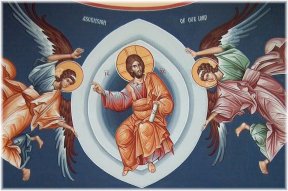
 HAT, EXACTLY, does the feast of the Ascension of our Lord celebrate? As folks who live in the space age, this holy day can seem a little arcane to us. So, what does it really celebrate? It celebrates the fact that our home is not on Earth. Our true home is in heaven.
HAT, EXACTLY, does the feast of the Ascension of our Lord celebrate? As folks who live in the space age, this holy day can seem a little arcane to us. So, what does it really celebrate? It celebrates the fact that our home is not on Earth. Our true home is in heaven.
Bishop Sheen once said that “the Ascension of Christ is the assurance of our own ascension into heaven after the Last Judgment.” So, yes, we certainly have hope that one day we, too, will be taken up into heaven. But, we actually don’t have to wait until we die.
Is it possible for our bodies to ascend into heaven right now? No. Our bodies will have to wait until we die. But a person is not merely a body. A person is both body and spirit, and it is the spirit that drives the body.
Our minds and our hearts do not have to wait to ascend to heaven. Even now, while we live & breathe & walk this Earth, our minds and hearts can be lifted up to heaven. This is what we should be doing every time we attend Mass and, in fact, every time we pray. St. Francis de Sales describes prayer as “an ascent or elevation of the mind to God” (Treatise on the Love of God, Book VI, chapter 1). St. Paul tells us: “Set your heart on things above, not on things of Earth” (Colossians 3:2).
Is that what you do when you come to Mass? Do you let your mind & heart be raised up to God? Do you set your heart on things above? Or do you let yourself be weighed down by your body and by the distractions of the here-and-now?
Our Lord ascends today into heaven, where we hope to follow Him in the Resurrection of the body on the Last Day. In the meantime, have we allowed our spirits to ascend to Him in prayer?

